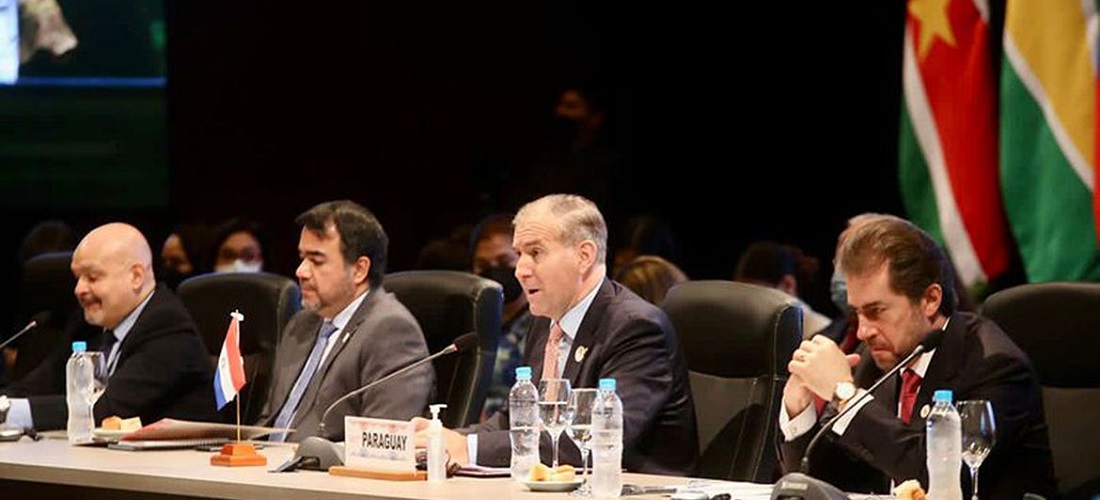
Mercosur bloc, Singapore strike free trade deal; announces new CET cut
Jul, 21, 2022 Posted by Gabriel MalheirosWeek 202229
After four years of negotiations, interrupted by the pandemic and resumed quickly in recent months, Mercosur and Singapore signed a free trade deal on Wednesday, July 20, that removes import duties on around 90% of bilateral commerce.
Regarding the non-tariff part, the agreement with Singapore may include broader commitments that are already part of Mercosur’s agenda: investment facilitation, service openings, and electronic commerce rules.
The trade deal between Mercosur and Singapore is the first of such kind between the South American bloc and its partners in Asia. The agreement’s final text will now undergo legal review before being signed, as dictated by the standard procedure. Then, to enter into force, it will need legislative approval in all countries.
Singapore’s Minister of Commerce, Gan Kim Yong, participated directly in the final talks. Argentina accepted the proposed terms despite being amid an inflationary spiral and a currency crisis, which led the peso’s value to fall in the parallel market.
Please see below a chart in which the main export and import trends between Argentina, Uruguay, and Singapore, in terms of TEUs, are displayed. The data below is from the DataLiner platform.
Singapore trade w/ Argentina and Uruguay | Jan 2021 – May 2022 | TEUs
Source: DataLiner (click here to request a demo)
The Brazilian government hopes that Singapore can establish itself as a gateway for the entry of Brazilian and Mercosur exports into Southeast Asia and the Pacific, two of the world’s most economically active areas.
Please see below a chart in which the main export and import trends between Brazil and Singapore, in terms of volume, are displayed. The data below is from the DataLiner platform.
Brazil – Singapore Trade | Jan 2021 – May 2022 | TEUs
Source: DataLiner (click here to request a demo)
Singapore has a network of 27 free trade agreements, which include the United States and the European Union, in addition to the CPTPP and RCEP mega-agreements. The first covers nations such as Australia, New Zealand, Japan, Mexico, Peru, and Chile. The latter also includes China, Korea, and the other ASEAN countries (Thailand, Malaysia, Indonesia, Philippines, Vietnam, Brunei, Cambodia, Laos, and Myanmar).
The small “city-state,” with almost 6 million inhabitants and one of the highest per capita incomes in the world, acquired US$ 6 billion in Brazilian goods last year and is already becoming a kind of “hub” for “green-yellow” multinationals to distribute their goods to other destinations in Asia.
Singapore’s direct investments in Brazil reach almost US$ 10 billion. The list of companies includes shipyards (Keppel Offshore and Jurong Shipyard), the airport operator Changi (which manages the Galeão in Rio de Janeiro), and the pulp industry Bracell. The sovereign wealth fund GIC holds interests in highway concessions, as well as in the sanitation company Aegea and Vibra Energia (formerly BR Distribuidora).
The Singapore-Mercosur trade deal is the first signed by Mercosur since 2019, when the bloc’s negotiations with the European Union and EFTA (Switzerland, Norway, Iceland, Liechtenstein) were concluded. The two pacts, however, were put on the back burner by Europeans in the face of rising deforestation in the Amazon and protests against President Jair Bolsonaro’s environmental policy.
The feedback given publicly by the EU and EFTA is that there would be no way to sign the agreements already closed nor ratify them in the respective parliaments without a significant reduction in deforestation indexes.
Outside of South America, the bloc – also composed of Uruguay and Paraguay – has free trade agreements in force with Isreal and Egypt. Plus, there are ongoing negotiations with Korea, Canada, and Lebanon.
According to estimates by the Brazilian Ministry of Economy, the Mercosur-Singapore agreement could increase Brazilian GDP by BRL 28.1 billion by 2041.
In addition to the treaty with Singapore, the Mercosur foreign ministers meeting in Asunción, where the bloc’s biannual summit takes place, formalized a 10% cut in the Common External Tariff (CET) by all member countries. It is the first coordinated reduction of import rates for products from external partners since the beginning of the customs union in 1994.
Last year, Brazil and Argentina agreed to reduce tariffs by 10% on around 9,000 products, which cover 87% of Mercosur’s nomenclature (groups of products). However, sectors considered more sensitive – auto parts, textiles, dairy products, peaches – were excluded from the reduction.
Such reduction, however, was only valid until December 2023. After that, the Bolsonaro government wanted to make it permanent. For this, it was necessary to convince Paraguay and Uruguay – the latter presented more resistance but eventually gave in.
The need to gather consensus from all Mercosur members will make an eventual rise in the CET more difficult in the future, making it be seen as an “anti-protectionist clause.” In May, Brazil enacted an additional 10% cut in its tariffs. For this second round of reduction, however, there has not yet been “mercosurization,” and the measure will only be valid until the end of 2023.
Source: Valor Econômico
To read the full original article, please go to: https://valor.globo.com/brasil/noticia/2022/07/21/mercosul-fecha-livre-comercio-com-cingapura-e-unifica-corte-de-tarifa.ghtml
-
Ports and Terminals
Jul, 10, 2024
0
Container Ship Docks at Port of Itajaí After 18-Month Hiatus, Delivering Over 1,900 Vehicles
-
Ports and Terminals
Jul, 20, 2022
0
Imbituba cargo throughput grows 19.3% in the first half of the year
-
Ports and Terminals
Jan, 09, 2023
0
Paraná ports celebrate new 58 million-tonne cargo throughput record
-
Shipping
Dec, 10, 2021
0
CMA CGM adopts winter surcharge for services from ECSA to Russia



